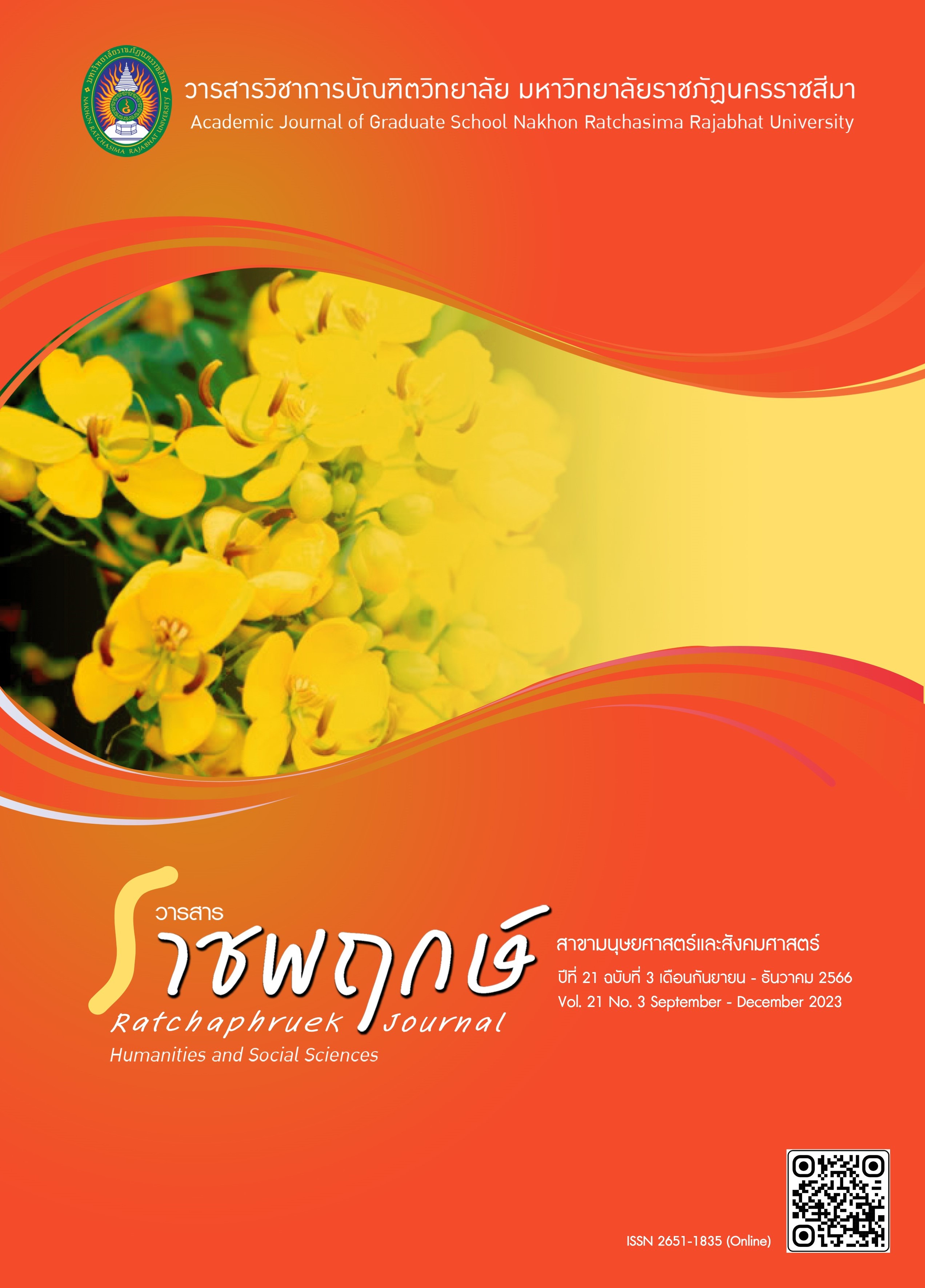Development of an Experiential Model Based on Executive Functions to Enhance Rational Thinking Ability for Pre-school Children
Main Article Content
Abstract
The purpose of this research was to develop an experiential model based on executive functions to enhance rational thinking ability for preschool children, which included four steps of research and development as follows: Step 1 study guidelines in providing experiences. Step 2 create, determine, and check the quality of the experiential model and to pilot the model. Step 3 try out the experiential model with the research sample group who were 25 students in Kindergarten. They were selected by simple random sampling, the random unit a classroom. Step 4 study of satisfaction with learning through the experiential model. The research findings were as follows. 1) The experiential guideline, the focus was knowledge and understanding of the teachers about EF brain skills in order to provide experiences that could enhance preschool children’s rational thinking ability. 2) As for the result of the quality check of the experiential model, overall, it was at the highest level. In addition, it was found that the effectiveness index (E.I.) of the experiential model was 60.34%. 3)The experiential model was able to enhance all aspects of rational thinking abilities. The mean score before experience management (= 8.80) was at a moderate ability level, whereas the mean score after the experience management (
= 12.80) was at a high ability level. After the preschool children learned through the model, they had significantly higher score than before learning at the .01 level. and 4) The preschool children in this study were satisfied with the learning experience at a high level.
Article Details

This work is licensed under a Creative Commons Attribution-NonCommercial-NoDerivatives 4.0 International License.
References
กระทรวงศึกษาธิการ. (2560). หลักสูตรการศึกษาปฐมวัย พุทธศักราช 2560. กรุงเทพฯ: โรงพิมพ์ชุมนุมสหกรณ์การเกษตรแห่งประเทศไทย.
กันตวรรณ มีสมสาร. (2560). การจัดประสบการณ์เพื่อพัฒนาเด็กปฐมวัยด้านการคิด ใน เอกสารการสอนชุดวิชาการจัดการศึกษาและหลักสูตรสำหรับเด็กปฐมวัย หน่วยที่ 12. นนทบุรี: มหาวิทยาลัยสุโขทัยธรรมาธิราช.
ชนิพรรณ จาติเสถียร, กันตวรรณ มีสมสาร และอภิรดี ไชยกาล. (2560). วิกฤตปฐมวัยและแนวทาง แก้ไข. กรุงเทพฯ: พลัสเพรส.
ดุษฎี อุปการ และอรปรียา ญาณะชัย. (2561). การเสริมสร้างพัฒนาการการเรียนรู้ของเด็กปฐมวัยควรเลือกใช้หลักการใด: “การเรียนรู้โดยใช้สมองเป็นฐาน” หรือ “การคิดเชิงบริหาร”. E-Journal, Silpakorn University ฉบับภาษาไทย สาขามนุษยศาสตร์ สังคมศาสตร์ และศิลปะ, 11(1), น. 1635-1651.
ทิพย์ศิริ กาญจน. (2550). คู่มือการใช้แบบวัดความสามารถทางสมอง. กรุงเทพฯ: โรงเรียนอนุบาลจุฬาสิริ.
นิพัทธา หรรนภา. (2565). สภาพแวดล้อมและกิจกรรมการเรียนรู้สำหรับเด็กปฐมวัย. วารสารคณะมนุษยศาสตร์และสังคมศาสตร์ มหาวิทยาลัยมหาสารคาม, 7(2), น. 57-72.
นิฤมล สุวรรณศรี. (2556). การพัฒนารูปแบบการจัดการเรียนรู้แบบ 4M เพื่อส่งเสริมทักษะการคิดเชิงเหตุผลสำหรับเด็กปฐมวัย (วิทยานิพนธ์ดุษฎีบัณฑิต, มหาวิทยาลัยศรีนครินทรวิโรฒประสานมิตร).
ประเสริฐ ผลผลิตการพิมพ์. (2562). เลี้ยงลูกอย่างไรให้ได้ EF (พิมพ์ครั้งที่ 10). กรุงเทพฯ: อมรินทร์ พริ้นติ้งแอนด์พับลิชชิ่ง.
พัชรี พลโยธิน. (2548). รูปแบบการจัดประสบการณ์เพื่อพัฒนาเด็กปฐมวัย ใน ประมวลสาระชุดวิชาการจัดประสบการณ์สำหรับเด็กปฐมวัย หน่วยที่ 4. นนทบุรี: มหาวิทยาลัยสุโขทัยธรรมาธิราช.
วันวิสา ม่วงทอง, วารีรัตน์ แก้วอุไร, อังคณา อ่อนธานี และจักรกฤษณ์ จันทะคุณ. (2563). ทักษะการคิดเพื่อชีวิตที่สำเร็จเพื่อส่งเสริมการคิดเชิงเหตุผลของเด็กปฐมวัย :สิ่งที่ไม่ควรมองข้ามสำหรับครู. วารสารราชพฤกษ์, 18(1), น. 20-28.
สุภาวดี หาญเมธี. (2558). EF ภูมิคุ้มกันชีวิตและป้องกันยาเสพติด: คู่มือสำหรับครูอนุบาล. กรุงเทพฯ: รักลูกบุ๊คส์.
สุภาวดี หาญเมธี. (2559). พัฒนาทักษะสมอง EF ด้วยการอ่าน. กรุงเทพฯ: รักลูกบุ๊คส์.
อรุณี หรดาล. (2563). สอนอย่างไรให้เด็กปฐมวัยคิดเป็น. วารสารวไลยอลงกรณ์ปริทัศน์, 10(2), น. 211-228.
Center on the Developing Child. (2011a). Building the Brain’s “Air Traffic Control” System: How Early Ezperiences Shape the Development of Executive Function. Working Paper 11. Retrieved May 1, 2019, from http://www. developingchild. harvard.edu
Center on the Developing Child. (2011b). InBrief: Executive Function: Skill for Life and Learning. Retrieved May 1, 2019, from http://www.developingchild.harvard.edu
Cooper-Kahn, J., and Foster, M. (2013). Boosting executive skills in the classroom: A practical guide for educators. San Francisco: Jossey-Bass.


